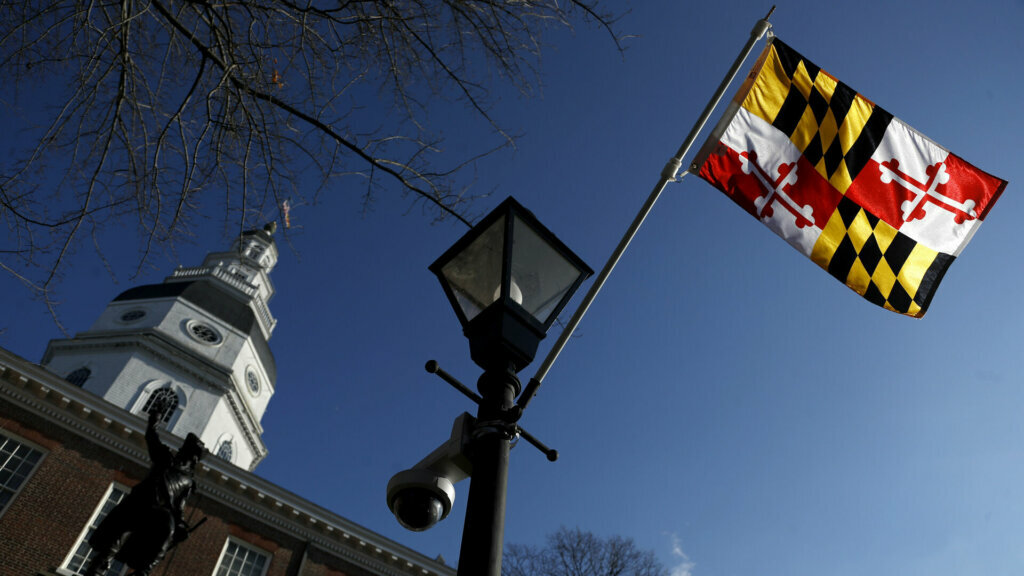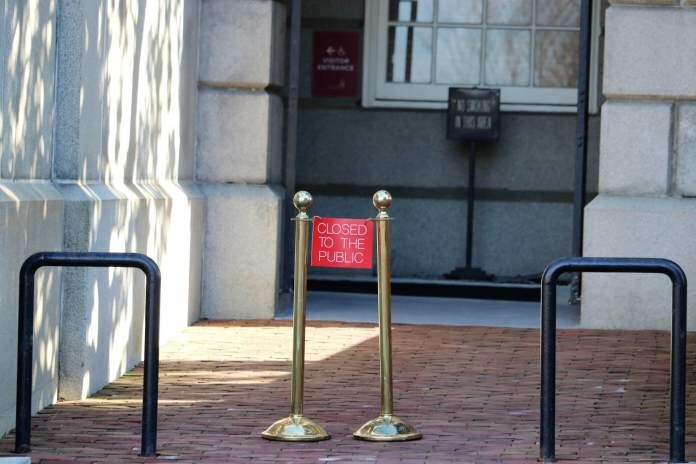This article was republished with permission from WTOP’s news partners at Maryland Matters. Sign up for Maryland Matters’ free email subscription today.

This content was republished with permission from WTOP’s news partners at Maryland Matters. Sign up for Maryland Matters’ free email subscription today.
State Del. Dereck E. Davis (D-Prince George’s) has served in the House of Delegates for 27 years and has been chairman of the Economic Matters Committee for the last 19. In years past, he frequently became annoyed when he slipped out of the committee room to answer nature’s call and found himself waylaid by lobbyists or advocates on his way to the men’s room.
Now, he’s feeling nostalgic about those encounters.
“There’s definitely an element that’s missing” from this year’s General Assembly session, Davis observed the other day, surrounded by absolutely no one on the second floor landing of the Taylor House office building.
With the 90-day General Assembly session now more than halfway over, that’s a near universal sentiment among all the regular denizens of Annapolis. With COVID-19 necessitating myriad restrictions in the State House and legislative campus, lawmakers, staffers, lobbyists, advocates and journalists find themselves missing and craving human contact.
Lobbyists and the general public are banned from legislative buildings. Lawmakers are limited to one in-person staffer each. A few journalists are around, but their ability to move around the legislative campus is restricted. Encounters with others in the hallways of the legislative buildings, which ordinarily would be teeming with people this time of year, are few and far between ― and even a little bit shocking when they occur.
“The peace is so loud,” Davis said. “The quiet is so loud.”
Not that legislative work isn’t being accomplished ― quite the contrary. Legislative churn is proceeding at a rapid clip, and many consequential bills have already fully passed or are close to passing, well in advance of the so-called crossover date on March 22, when bills need to pass one chamber to guarantee consideration in the other.
As of Monday, 974 bills had been introduced in the Senate this session, and 169 had passed out of the chamber; 1,384 bills had been introduced this session in the House, 201 had passed. In addition, the legislature has overridden more than three dozen of Republican Gov. Lawrence J. Hogan Jr.’s vetoes.
“We are doing what we can here to try and meet the needs of the people of Maryland,” Senate President Bill Ferguson (D-Baltimore City) told reporters during a virtual news conference on Friday. “We feel a great deal of responsibility.”

But with all but a few outsiders banned from the State House and legislative buildings; with all hearings being held virtually; with senators working out of individual pods on the Senate floor; and with delegates physically divided between the main House chamber in the State House and an auxiliary meeting room across the street, the joys of a legislative session ― the spectacle, the crowds, the serendipity of running into someone unexpected in the hallway of of a legislative building ― are gone.
“It’s a weird session,” said veteran lobbyist Eric Gally.
That’s an understatement. Most everyone interviewed for this story at one point another used the word “surreal” to describe their experience.
One veteran of 15 sessions called this the worst she’s ever experienced ― even worse than 2019 when House speaker Michael E. Busch (D) fell ill and died on the next to last day of session. Asked to describe this session, one senior lobbyist used multiple expletives and didn’t say much else.
But there is almost universal acceptance of the steps legislative leaders have taken to keep members, their staffs and the public safe. And lawmakers said they are coping as best they can.
“You eventually get into a rhythm,” said Del. Jheanelle K. Wilkins (D-Montgomery).
Ferguson said that trying as the circumstances are for legislators, they are mindful of the challenges their constituents are facing every day.
“It’s been really hard in many ways,” he said. “I think this is a very straining environment in which to do the people’s business. It’s been a very hard session. But it’s not as hard as it’s been for the people of Maryland for the past year of the pandemic.”
Life in ‘the penalty box’
Maryland isn’t the only legislature where members are meeting under dramatically different circumstances because of the pandemic. In Virginia, for example, the state Senate has been meeting in a science museum in Richmond.
There’s a kind of gallows humor to the circumstances. Lawmakers have compared the Senate floor to a maze for laboratory mice. Delegates assigned to the “chamber annex” in the House office building have developed several nicknames for their room. Del. Brian A. Chisholm (R-Anne Arundel) has at varying times referred to the designated area for speakers in the annex as “the penalty box” or the “21st century phone booth.”
Del. Vaughn Stewart (D-Montgomery) said he is relieved that House floor sessions are taking place, even if he is working from the annex, because at least he gets to see half of his colleagues.
“It feels a little less monastic than when you’re just doing everything by Zoom,” he said.
What’s more, by happenstance or not, when floor sessions are over, many delegates find themselves gathering by the elevators in the Lowe House office building, whether they’ve been on the House floor or in the chamber annex. They don’t linger, but they seem happy to see each other.
Zoom meetings can be endless sources of frustration for lawmakers ― not just for the tedium, not just for the zoning-out quality of staring at a small screen for hours at a time, but because they have scrambled the legislative process in incalculable ways.
During a lengthy voting session debate about a bill banning animal testing in cosmetics in the House Health and Government Operations Committee last week, Del. Susan Krebs (R-Carroll) expressed frustration.
Republican members of the committee were looking to hold the bill for potential additional changes and research, though the same concerns hadn’t been brought up during subcommittee meetings, or during the bill hearing.
“I think there’s a lot of bills that we have in our committee, a number of them that no one has come out against, because it’s just impossible right now to track all these things,” Krebs said, adding that many members were under the impression that only the “most important issues” would be legislated during the pandemic.
After some assurances from committee Chair Shane M. Pendergrass (D-Howard) and Vice Chair Joseline Peña-Melnyk (D-Prince George’s) that members could have the time they need to review and consider legislation, the bill was temporarily held.
Pendergrass reminded everyone that things could become more stressful and tense as Crossover Day approaches, particularly with the uncertainty of this legislative session. She likened navigating the 2021 session to the skill and difficulty required of Fred Astaire’s dancing partner, Ginger Rogers: “Everything is backwards and in high heels,” she said.
‘I came down to see if I was missing anything’
One of the most dramatic and noticeable missing elements of this legislative session is the absence of lobbyists and other advocates in the State House lobby or outside the building, waiting to flag down lawmakers as they make their way to floor sessions. One veteran lobbyist, D. Robert Enten, told Maryland Matters that he has only felt it necessary to come to Annapolis once during the session so far.

Gally, who has an office on State Circle, came to Annapolis recently for two days, almost reflexively, but then wound up doing most of his work by Zoom from a hotel room.
“I came down to see if I was missing anything, to see if anybody was talking about me,” he said, only half joking.
Sen. Brian J. Feldman (D-Montgomery) said the most noticeable differences are in committee hearings.
“I think I never fully appreciated the interpersonal-connection component to legislating,” said the lawmaker, who is vice chair of the Senate Finance Committee.
“The inability to sit in the conference room with stakeholders, around a table, with the bill in front of you, and actually hash out details to come to compromise, is all lost,” he said.
Zoom meetings are “no substitute,” the lawmaker said. “It’s very difficult to navigate through the minefield to get to a common place on those kinds of bills” without face-to-face meetings.
He said he also misses the in-person interactions with lobbyists, “who often are helpful to come into your office and frame the issues.”
Del. Samuel I. Rosenberg (D-Baltimore City) said he also misses the unexpected encounters with others that are a staple of State House life.
“You don’t run into people,” the longtime legislator observed. “You pick up information about your own bills. … So you have to adjust. It’s all about adjusting.”
Communication is particularly difficult in the House of Delegates, because members are physically apart.
“The basics are the same, but you have to figure out how are you going to be in contact with the people you need to be in contact with.”
A warming trend in Annapolis this week could bring a temporary semblance of normalcy. It seems entirely likely that more lobbyists will emerge, from the shadows, and stand in front of the State House as legislators stream in. Next week looks colder and rainier, so then they’ll probably retreat.
Permanent reforms?
Several lawmakers said many of the changes introduced this year represent improvements and should be retained. Among them: the live-streaming of committee voting sessions and the ability for the public to testify electronically.
“People don’t have to schlep from Salisbury or Frederick, find a parking place in Annapolis, and then sit in a hearing room for four hours until they get to your bill,” said Sen. James C. Rosapepe (D-Prince George’s). “Now people from all over the state can watch the hearings easily… and they can testify. So it’s much more democratic, much more open to the public.”
Rosapepe said limits on the number of witnesses on each bill is also a plus.
“Having a few ‘pro-‘ witnesses and a few ‘con-‘ witnesses frames the issue in a way that people are paying attention,” he said.
Not everyone loves the changes.
One longtime lobbyist said that if every year was like this one, “I would retire.”







